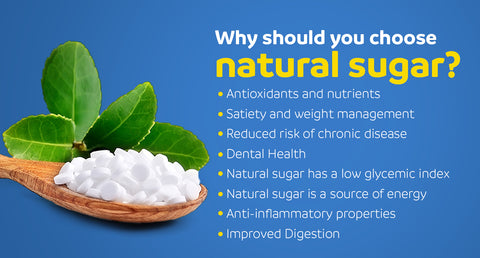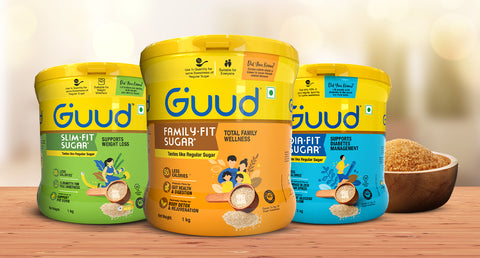“Itni cheeni mat khao," “sugar level badh jaega," “Itna meetha khaane se diabetes ho jaega!” We are sure that you hear these phrases regularly. From its impact on health to its important role in weight management, sugar has always been a topic of discussion.
Well, they were correct. As consumers, you need to be aware of the kinds of sugar and how much of each is good for you. This blog will clarify a few important differences between natural and added sugar that everyone must know about.
In this article, you'll look at:
- What is natural sugar?
- What is added sugar?
- Why should you choose natural sugar over added sugar?
- How can you manage your sugar intake?
What is natural sugar?
Natural sugars are those that occur naturally in fruits, vegetables, and dairy products. They naturally contain sugar in addition to other essential vitamins, minerals, and fibres. Fruits contain natural sugars called fructose and glucose, which are very healthy for you.
The fibres present in such foods prevent the sugar levels from spiking and also slow down the absorption of sugar into the blood.
What is added sugar?
Added sugar refers to the syrups and ‘extra’ sugar that is added to foods and beverages during their preparation. These include sugars such as sucrose, glucose, and high-fructose corn syrup. Added sugars are mostly found in processed foods like cakes, candies, sodas, and many more. Consuming large amounts of this kind of sugar can have health risks, such as heart disease or high blood sugar.
Related: 10 Health Risks of Refined Sugar You Must Know
Why should you choose natural sugar over added sugar?

1. Antioxidants and nutrients
Antioxidants present in natural sugar help fight the free radicals that can damage the cells in the body and contribute to dangerous diseases such as cancer and skin ageing.
Conversely, nutrients provide several health advantages for natural sugar, such as a strong immune system and heart.
2. Satiety and weight management
Foods containing natural sugar tend to be more filling when compared to processed foods made up of added sugar. The fibre, water, and minerals present in whole foods prevent you from overeating as they regulate your appetite.
Opting for fruits and vegetables in your diet can help you with your weight management because they have natural sweetness, very few calories, and no added sugar.
3. Reduced risk of chronic disease
A high intake of added sugar can cause various health problems, such as type 2 diabetes, obesity, and other chronic diseases.
In contrast to these sugars, whole foods containing natural sugar reduce the risk of such health problems. The combination of nutrients, minerals, and vitamins supports optimal health and a long life.
4. Dental Health
Fruits and vegetables that contain natural sugars are less likely to contribute to dental problems such as cavities as compared to added sugars.
The fibre and water content present in these healthy food items help to clean your mouth and produce saliva, which protects the tooth enamel from decay.
Limited consumption of sugary foods and beverages protects your teeth from cavities and helps maintain oral hygiene as well.
5. Natural sugar has a low glycemic index
Natural sugars have a relatively low glycemic index in comparison to processed foods with added sugars. Foods with low GI lead to a slower and gradual increase in blood sugar levels.
Added sugar increases the risk of insulin resistance and often leads to energy crashes.
6. Natural sugar is a source of energy
Unlike a sudden spike in blood sugar levels after consuming food items containing added sugar, whole foods offer energy to the body without a negative impact on mood or productivity.
Including natural sugar as a part of your diet provides you with long-lasting energy and vitality and takes care of your overall well-being.
7. Anti-inflammatory properties
Food items high in added sugar lead to a high risk of inflammation, which further causes several health problems.
Choosing natural sugar from whole foods that are rich in antioxidants and fibres can provide support for a healthy digestive system and promote long-term health outcomes.
8. Improved Digestion
Studies suggest that the fibre present in natural sugar-containing foods acts as a prebiotic that reduces the chances of constipation, promotes regularity, and is beneficial for the gut.
How Can You Manage Your Sugar Intake?

1. Read food labels
Whenever you buy any type of food or beverage, look for terms such as glucose, sucrose, corn syrup, etc. These are the words that help you identify the added sugars in these food items. Keep track of the serving size and total grams of sugar per serving to make a mindful choice while purchasing those items.
2. Be mindful of beverages
You must be cautious regarding the type of beverage you consume. Sodas, shakes, and other sweetened teas contain high amounts of sugar that can be harmful to your health. Instead, opt for herbal tea, water, or lime water for hydration without added sugars.
3. Limited processed foods
Minimize the intake of sugary foods, candies, cakes, and desserts, which can add calories to your diet. They contain added sugars, which have low nutritional benefits that can hurt your health and lead to chronic diseases.
4. Sweeten smartly
Use natural sweeteners such as honey or maple syrup in your desserts and beverages in moderation instead of added sugars. You must track the amount of sugar you add and also keep a check on the calories you intake while eating sugary foods. Alternatives to sugar, like stevia sugar, can be used in place of high-GI and high-calorie sugars to satisfy your taste buds!
5. Keep portions in control
Make sure you maintain a balanced diet while eating these sugary foods. Too much consumption of natural sugar might also be harmful to your health. Aim to include more proteins, fibres, and foods rich in vitamins and minerals that can help stabilize your blood sugar levels and reduce your cravings for sweets too.
6. Practice mindful eating
Be mindful of the portion size of the desserts that you are indulging in. You must be careful when choosing the kind of dessert. For instance, consuming only those sugary snacks or desserts that have few calories won't spike your blood sugar levels instantly, and it won't be a cause of your obesity.
Well, now that you have a little insight into how natural sugars differ from added sugar, you must be wondering where to purchase them from. Look no further, as we are about to reveal your “sweet” companion, GUUD Sugar! But why choose them? Let's find out!
GUUD sugar - Best Natural Sugar

GUUD sugar is a natural sugar that is a perfect blend of Ayurveda and modern technology! It is as sweet as regular sugar but with fewer calories and GI. “Guud Sugar” helps to control your blood sugar levels, improve your gut, and promote weight management.
Top reasons for making a GUUD switch!
- Double the sweetness with half calories
- Rich in herbs
- 100% natural sugar
- Low glycemic index natural sugar
- Safe for all and easy to use
- One spoon of GUUD sugar is equal to two spoons of regular sugar
- It helps with weight management and reduces the risk of blood sugar spikes
- It is rich in stevia, making it a healthier option to choose
So, what could be more refreshing than eating delicious treats every day while keeping your blood sugar levels stable? Can't believe how? Watch how to make caramel pudding with Guud sugar!
Also Read: What is the Difference Between Natural Sugar and Refined Sugar?
Take Away
The debate between natural and added sugars continues. Natural sugars, which are found in abundance in fruits and vegetables, offer many health benefits, including essential nutrients and antioxidants that help prevent cell damage. On the other hand, added sugars are present in processed foods and can pose risks to heart health and blood sugar levels. To improve your health, it's best to choose nature's sweet gifts over the dangers of added sugars. Make your choices wisely and live a healthy life.
Clear Your Doubts!
1. Is natural sugar a better option than added sugar?
Yes, natural sugar is indeed a better option for you when compared to added sugar. They are packaged with fibre, vitamins, and minerals that can help you manage your weight and have fewer calories, making them safer to consume.
2. Does your body know the difference between natural sugar and added sugar?
The human body is not accustomed to differentiating between naturally extracted sugar and sugar added to processed foods. Though all carbohydrates are broken down into simple sugars in the same way, this does not mean that a cupcake and an apple have the same value in terms of nutrition.
3. Do natural sugars count towards daily intake?
The sugar present in fruits and vegetables is not complex, and hence we need not limit their consumption. They are not considered free sugar but are rather added to the total sugar figure listed on food labels.
4. Which type of sugar is the healthiest?
Those sugars that are not processed, for instance, honey or maple syrup, are considered to be the healthiest form of sugar. They are rich in vitamins, fibres, and minerals and help control your blood sugar levels.
5. Is jaggery better than sugar?
Jaggery contains fibre, iron, and essential nutrients that are good for our bodies. Sugar, in contrast, just contains calories and has no value-adding properties, making it dangerous to consume it every day. Though jaggery is rich in nutrition when compared to sugar, it must be eaten in moderate proportions due to its high-calorie content.
